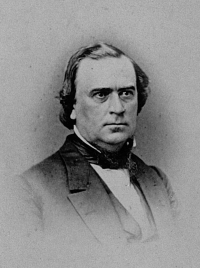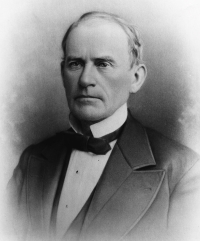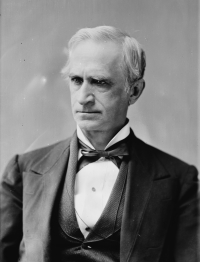
The 1871 election of a U.S. senator from Delaware remains unique in Senate history. That year, Senator Willard Saulsbury, Sr., of Delaware sought reelection to a seat he had occupied since 1859. With two Senate terms behind him, Saulsbury was quite confident that he could easily gain the 16-vote majority he needed from the 30-member state legislature, but—to his surprise—two serious competitors challenged him for the seat.
Willard Saulsbury began his Senate career in 1859 as a “copperhead” (or “peace Democrat”), someone who resisted secession and opposed war while maintaining opposition to the abolition of slavery. Believing that the Union could be saved through peaceful means, he proposed a “Central Confederacy” of states that excluded the extreme proslavery states of the South as well as the radical antislavery states of the North. His proposal was ignored.1

Soon after taking office, Saulsbury began having “political difficulties,” often due to a combination of his combustible personality and his fondness for alcohol. In 1863, for example, as the Senate debated a bill to criticize President Abraham Lincoln’s suspension of the writ of habeas corpus, Saulsbury accused Lincoln of being a “weak and imbecile” man. “If I wanted to paint a despot,” he proclaimed, “I would paint the hideous form of Abraham Lincoln.” Vice President Hannibal Hamlin called Saulsbury out of order and demanded that he take his seat, but the Delaware senator refused. When Hamlin directed the sergeant at arms to “take the senator in charge,” Saulsbury drew a pistol. “Let him do so at his expense,” he cried and threatened to shoot the officer. Days later, facing a resolution of expulsion, Saulsbury apologized. The Senate considered expelling him again in 1867 when he repeatedly appeared in the Chamber intoxicated, but Saulsbury managed to escape disciplinary action.2

Not surprisingly, by 1871 members of the Delaware state legislature had grown concerned about Saulsbury’s erratic behavior. As his reelection drew near, party leaders discretely approached another possible candidate—the senator’s elder brother, Gove Saulsbury. A physician and out-going governor of Delaware, the ambitious Gove readily agreed to challenge his younger brother. Willard cried foul and charged Gove with betrayal, vowing to stop at nothing to defeat him. Thus the two brothers—Willard and Gove—became fierce competitors for the Senate seat. As if that wasn’t complicated enough, when state legislators prepared to vote on January 17, 1871, a third, surprise candidate appeared—Eli Saulsbury, the third brother. Three brothers—one Senate seat.
On the first two ballots, the incumbent Willard drew 13 votes, but Gove got 14 with Eli trailing far behind. On the third ballot, Gove held the lead with 15, followed by Willard at 14, leaving just a single vote for Eli. As the fourth ballot began, knowing that Gove was just one vote away from a majority, a bitter Willard released his supporters and backed brother Eli as a compromise candidate. Eli Saulsbury won the election.3
Unlike his very competitive brothers, Eli was not a fiery orator nor a partisan crusader. “He was a quiet plodder,” suggested a reporter, “a lawyer by profession, and a man who was plain and unassuming.” He was also a dedicated teetotaler. Eli Saulsbury remained in office for the next 18 years.
Notes
2. Richard A. Baker, 200 Notable Days: Senate Stories, 1787 to 2002 (Washington, DC: Government Printing Office, 2006), 77; Hancock, Delaware During the Civil War, 129; Jonathan W. White, Abraham Lincoln and Treason in the Civil War (Baton Rouge: Louisiana State University Press, 2011), 72; Mark Scroggins, Hannibal: The Life of Abraham Lincoln’s First Vice President (Lanham, MD: University Press of America, 1994), 195; Congressional Globe, 37th Cong., 3rd sess., January 27, 1863, 549–84; Robert C. Byrd, The Senate, 1789–1989: Addresses on the History of the United States Senate, vol. 2, ed. Wendy Wolff, S. Doc. 100-20, 100th Cong., 1st sess. (Washington, DC: Government Printing Office, 1991), 98–100.
3. “Hon. Eli Saulsbury, the New Senator from Delaware,” New York Times, January 20, 1871, 2; “Washington: The Closing Scenes of Congress,” Chicago Tribune, March 5, 1871, 2; “United States Senators Elect: Eli Saulsbury, of Delaware,” Baltimore Sun, January 19, 1871, 1; “Political,” Chicago Tribune, January 26, 1871, 3.